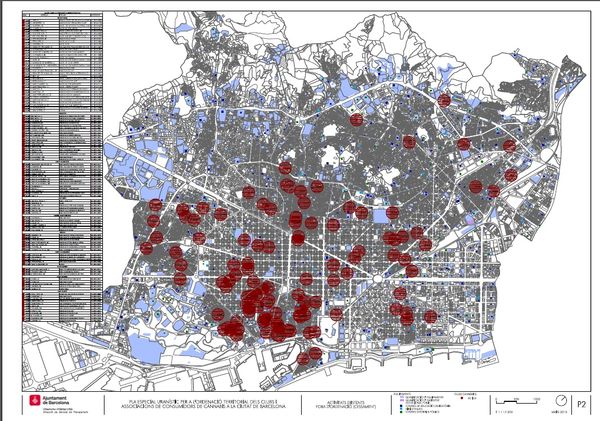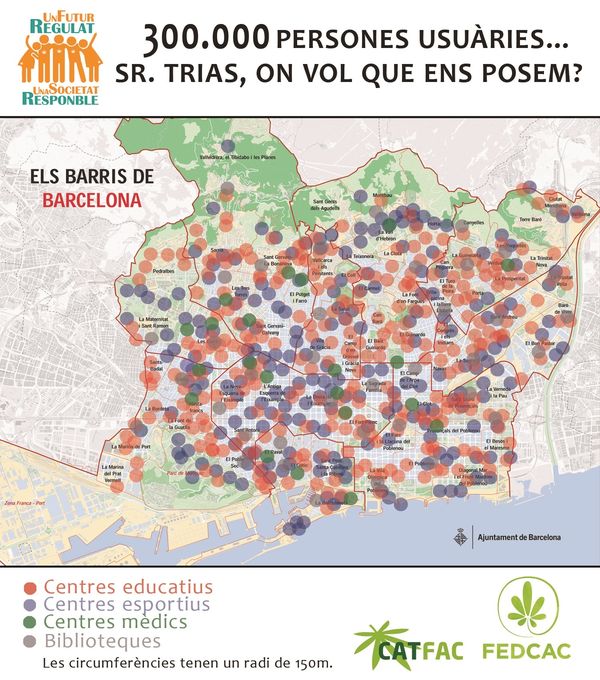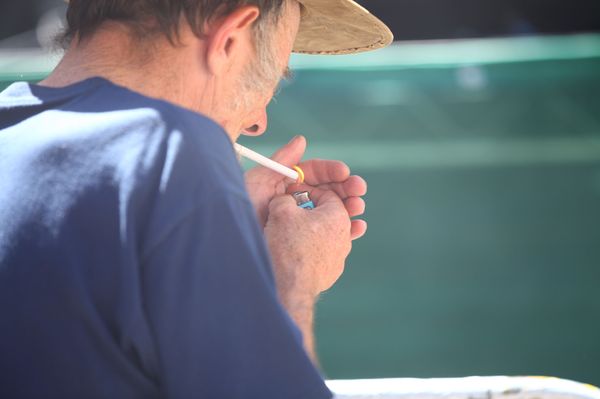- The Government of Xavier Trias, the current mayor of Barcelona, have just presented a development plan that is aimed at reducing the number of cannabis clubs in the city from 123 to 11. They have done this with only a few days remaining until the election and their decision has taken the entire sector by surprise, although thankfully they still have to overcome several obstacles. For a start, on 24 May we will find out if CiU win the elections again. The polls do not look good for them.

Right in the middle of an electoral campaign, on 6 May, the Government Committee from Barcelona Town Council finalised initial approval for a special development plan that is aimed at closing down a large number of the cannabis social clubs that are open in the Catalan capital. As such, according to initial estimations, the city would see its selection of clubs reduced from 123 to 11 between now and 2017. This is what will happen is CiU remains in power and their plan is backed by the Plenary.
Despite the fact the city council initially talked about the possible closure of “around twenty clubs”, the figure has risen drastically after the council decided that there should be a minimum distance of 150 metres between these clubs and medical, cultural, teaching and educational institutions that were likely to be frequented by minors.
The initial approval of this plan, as Jaume Xaus, spokesman for the Federation of Cannabis Associations in Catalonia (CatFac) explained to Dinafem is also aimed at extending the moratorium on the issuance of licenses that was to end in June. This means that “associations that did not have a license or who had not finished the procedure to acquire one will still be unable to open”.

The city’s mayor Xavier Trias explained that the purpose of the decision is to “prevent Barcelona from becoming a benchmark throughout the world for cannabis”. He considers it to be a logical measure from a health point of view to avoid those premises “from ending up creating a cannabis market”. Also, another of his objectives is to prevent young people from trivializing consumption. “If someone wants to see the damage caused by cannabis to young people”, said the mayor, “they just need to go to hospitals and they will explain the situation to you there”.
The plan will be made public in less than ten days and the phase for making declarations will be open for two months. “The only thing we know at the moment is that the plan moves clubs away from any institution or space where there may be minors present”, says Xaus. “When we get to read the text, we will decide if we will propose amendments or any last minute appeal”.

The spokesperson from CatFac explains that the council’s decision has not only taken the cannabis sector by surprise, it has also surprised the other political parties, the Council’s Drug Dependency Committee, the health sector, and all of the risk reduction experts. “It is something that we were not expecting because we had worked on it at all levels and with a very different approach, and there was a consensus, even from the CiU”. In fact, associations from the sector were at the Town Hall when they found out about the decision that they have branded as “electioneering”.
As part of the “We are what we grow” campaign, associations of cannabis users even requested a meeting with the mayor on 18 February in order to explain the situation of more than 300,000 people in Barcelona who are a part of these associations. They also wanted to discuss all of the self-regulation proposals that were being worked on between the two federations. The mayor did not even respond to the request.
According to the federations, “it was Trias himself who, almost a year ago, decided to have a moratorium on the issuance of licenses for activities in clubs and associations and urged for a participative process with the entire sector, in order to find a satisfactory compromise for everyone in the city. Now, as the period that he himself fixed, is about to end, he is ignoring all of the work that is being done to reach a consensus”.

It is evident that there has been a change of direction within the party itself, without prior warning, just when the election campaign is in full swing, and “without reason or judgement”. The arguments used by the Catalan council, says Xaus, are unrelated to safety or health issues; they are simply “moralistic opinions”. The federation he belongs to does not understand why such a decision “has to be used as an election tool to scrape together a few votes".
Furthermore, the activist states that this is not the first or second time the Barcelona Council has responded to a marijuana related problem by saying they will move it away from schools and minors. Xaus believes that this is a means "of telling the city that the problem has been resolved, without talking, without explaining anything, without tackling it head on. That is to say, of limiting the clubs so they are no longer in the way, and to calm tensions”,
However; are cannabis clubs really seen as such a big problem for Barcelona? According to Xaus, it seems the answer is yes, especially because of the rise in cannabis tourism coming from Italy, France, and Germany, and due to some press headlines that talk of Barcelona being the new Amsterdam.

Additionally, it has been discovered that some associations and CSCs have "practices that leave a lot to be desired”, with users inviting others to consume cannabis, offering discounts in the street, or allowing minors into the premises. There have even been places where cannabis has been adulterated with highly dangerous substances. “This is something that creates a lot of disagreement within the council”, says Xaus. Although these cases are not typical, they exist precisely because the sector is not regulated and some people prefer to set the political battle to one side “in order to find the opportunity to make easy money while giving a very bad image of the cannabis movement itself and creating fear among legislators”.
Such dubious behaviour could intensify as a result of the Council’s decision. According to a statement from CatFac, closing 80% of the clubs would "leave the sector in the hands of a monopoly that would be much more difficult to control”.
Furthermore, both CatFac and Fedcac bemoan the fact that the decision “does not take the rights of users into account, the legal insecurity they suffer and the rise of the black market” that the situation can create. They believe that that the mayor has not paid any attention to all of the work carried out by the Council’s own Drug Dependency Committee. This work involved different experts and representatives from associations discussing and agreeing upon criteria for the regulation of associations in order to ensure coexistence.
If CiU remain at the head of the Government following the elections, they will have to negotiate the plan with the remaining parties and submit it for approval to the Plenary. However; Xaus says that cannabis activists are hoping that when that time comes, “the political landscape will have changed in Barcelona” so that the question is readdressed and everything starts from scratch. The situations and criteria than have been taken into account in the current plan, have no political support other than CiU”, he states.

It is true to say that it looks like change will happen. According to the latest poll by CIS, Ada Colau, a candidate for Barcelona en Comú, is the best placed candidate to win the elections. Her party, along with Esquerra Republicana and Iniciativa per Catalunya Verds (who are standing in Barcelona as part of Comú), are all willing to regulate cannabis social clubs “while taking into account the opinion of the sector”, states Xaus.
Cannabis associations are complaining that closing down cannabis social clubs means pushing users out into an illegal market and leaving them in the hands of criminal organizations. Now, it will be necessary to wait for the plan to be made public and for the elections to take place in order to find out if CiU will be charge of the Catalan council again. Or, the announcement could simply end up being a desperate measure to capture votes by a mayor who already sees that power is slipping away from him.
It seems that following the initial period where a large number of clubs were opened, with a wide range of practices and mentalities, the future will revolve around greater control and regulation. That would help to eliminate bad practices and the large amount of people who are motivated by profit without much interest for health, social, association matters. It is expected that all clubs which try to operate within the strictest legal framework should find a place within regulation that is supported and respected by all of the parties involved.
----------------------------



Comments from our readers
There are no comments yet. Would you like to be the first?
Leave a comment!Did you like this post?
Your opinion about our seeds is very important to us and can help other users a lot (your email address won't be made public).